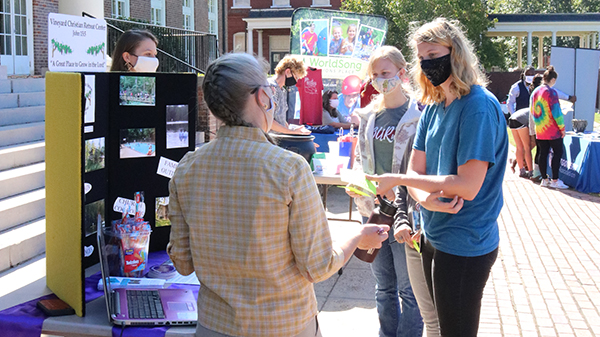In 2021, The Wall Street Journal/Times Higher Education College Rankings listed Samford University second nationally for student engagement.
The ranking recognizes the broad range of student organizations, global study opportunities and courses offered to Samford students, as well as elements of campus life such as worship, convocation programming, faith enrichment events and global missions.
Brian Kennedy, assistant dean in Samford’s office of admission, called studying at Samford “a highly tailored educational experience that results in consistently high employment and graduate school acceptance rates.”
But Samford isn’t alone among Christian colleges seeking to engage students in a broad range of academic, personal and spiritual growth opportunities.
“At the University of Mobile, we consider student engagement to be of utmost importance to success,” said Shirley Sutterfield, UM executive director of student success. “It includes the student being actively involved in academics, student life, spiritual life and their calling and career.”
The mission of UM is to help students grow academically, spiritually, socially, emotionally and professionally, Sutterfield said.
While graduation rates are important, UM wants its students to “thrive” not only in school but beyond, she added.
“The more actively involved they are in all areas, the better understanding they will have of themselves, their future and career, the God we serve and the kingdom of God we seek to advance,” she explained. “It is important for students to identify their calling, as well as their gifts, strengths and talents, and know how to utilize these as they engage in academics.”
Students should be attentive to their studies, but engagement is much more than just academic, said Chris Lee, student success coordinator at Southeastern Baptist Theological Seminary, home of The College at Southeastern, in Wake Forest, North Carolina.
“Engagement can be multidimensional — including cognitive, emotional, behavioral and communal dimensions — and involves the student’s relationship to their professors and peers, along with institutional curriculum, community and culture,” Lee said.
Role of local church
For students who are Christians, engagement also includes being part of a local church, according to Dustin Bruce, dean of Boyce College at Southern Baptist Theological Seminary in Louisville, Kentucky. Discipleship and mentoring should be part of each student’s growth, Bruce said.
An engaged student resembles Christ, he said. Using programming and unstructured discipleship, as well as worship services with the college and seminary, Bruce said the school tries to create an “organic” process of discipleship. Part of that is assigning older and younger students to live together, learning from and helping one another.
Lee said each student’s engagement will vary from semester to semester and may depend on whether the student finds a topic or professor interesting.
But engagement is critical to a student’s long-term success, he said.
“Student engagement is important because the engaged student will be more likely to excel in their studies and successfully complete their program.”






Share with others: